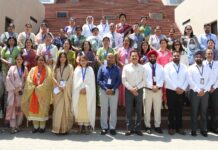Start an exciting journey in geography with a Master of Science (M.Sc.) degree. This program lets you study the Earth’s complex systems and use geospatial data. It’s perfect for those wanting to shape cities or do groundbreaking research. An M.Sc. in Geography opens doors to many rewarding careers.
When you explore msc geospatial sciences, geospatial science, and geo spatial information science, you’ll learn a lot about our world. You’ll mix theory with practice to understand Earth’s natural and human sides. You’ll learn to analyze and interpret geospatial courses and msc geographic data science. This will prepare you to solve big challenges like climate change and sustainable development.
Key Takeaways
- Gain a multidisciplinary understanding of the Earth’s systems and their interactions.
- Develop expertise in geospatial data analysis and remote sensing technologies.
- Contribute to cutting-edge research and innovative solutions for environmental management and urban planning.
- Unlock diverse career opportunities in fields such as environmental consulting, urban planning, and geospatial intelligence.
- Enhance your problem-solving, critical thinking, and communication skills, making you a valuable asset in the job market.
Exploring the Vast Horizons of Geographic Studies
Getting an M.Sc. in Geography opens up a world full of opportunities. It helps you understand the Earth’s complex systems. You’ll dive into physical landscapes, how humans interact with the environment, and the complex relationships that shape our planet.
Unraveling the Complexities of the Earth’s Systems
As a geography student, you’ll learn about many topics. These include climate, hydrology, urban development, and resource management. You’ll see how natural and human environments interact. This helps you solve real-world problems with a complete view.
A Multidisciplinary Approach to Understanding Our World
The M.Sc. in Geography program combines geospatial science and geo spatial information science. This gives you the skills to analyze complex systems and find important insights. You’ll connect different fields like earth sciences, environmental studies, and urban planning. This gives you a deep understanding of our world.
Career Opportunities in a Geospatial World
Today, the world relies more on geospatial data and tech. M.Sc. Geography leads to many career paths. You can work in urban and regional planning, environmental management, transportation, and disaster management. There’s also a big need for experts in geospatial analysis, remote sensing, and geographic information systems (GIS).
A M.Sc. in Geographic Data Science program gives you technical skills and helps you think critically. You’ll be ready to solve complex spatial problems. You’ll use the latest tools and methods to make informed decisions.
| Career Opportunities | Key Skills Developed |
|---|---|
| Urban and Regional Planning | GIS analysis, spatial modeling, land use planning |
| Environmental Management | Remote sensing, spatial data analysis, environmental impact assessment |
| Transportation Planning | Network analysis, traffic modeling, route optimization |
| Disaster Management | Geospatial data integration, risk assessment, emergency response planning |
| Geospatial Analysis and Consulting | Spatial data management, geovisualization, geospatial programming |
Geospatial courses are always getting better. The value of M.Sc. in Geographic Data Science is growing. This means geography graduates have endless career possibilities. They use spatial data and tech to shape our future.
Future Scope & Benefits for Master of Science (M.Sc.) in Geography
Getting an M.Sc. in Geography opens up many career paths and research chances. This program gives you skills that many industries want. You become a key person in any team.
Unlocking Diverse Career Avenues
With an M.Sc. in Geography, you’ll know a lot about spatial analysis, data visualization, and environmental modeling. These skills are very wanted. You can work in many areas, like urban planning, environmental management, or geospatial data science. Some jobs you can get include:
- Geographic Information Systems (GIS) Analyst
- Environmental Scientist
- Cartographer
- Urban Planner
- Remote Sensing Specialist
- MSc Geospatial Sciences Professional
- MSc Geographic Data Science Expert
Cutting-Edge Research and Analysis
An M.Sc. in Geography also prepares you for top-level research and discoveries. You’ll learn advanced analytical methods through tough courses and projects. This helps you solve complex problems and find new solutions.
Geospatial Data Analysis and Remote Sensing
In today’s world, understanding and analyzing geospatial information is key. With a M.Sc. in Geography, you’ll explore the latest in geospatial science and geo spatial information science. You’ll learn about Geographic Information Systems (GIS), remote sensing, and spatial modeling.
These tools and techniques help you get insights from complex data. This lets you make smart decisions and innovate in fields like urban planning, environmental management, transportation, and public policy.
Harnessing the Power of Geographic Information Systems
Geographic Information Systems (GIS) change how we see and interact with our world. You’ll get hands-on training and work on projects. This way, you’ll learn to use GIS to:
- Collect, organize, and analyze geospatial data from different sources
- Create new spatial models and visualizations to find hidden patterns and trends
- Use GIS for decision-making in land-use planning, resource management, and emergency response
By getting good at these skills, you’ll be ready to solve complex real-world problems. You’ll help advance geospatial science and geo spatial information science.
Environmental Management and Sustainable Development
Today, we face big environmental challenges. An M.Sc. in Geography gives you the skills to help create a better future. This degree covers ecosystem management, climate change, and how to assess environmental impact. It prepares you to lead in environmental management and sustainable development.
With geospatial courses, you’ll understand how human actions affect nature. You’ll use GIS and remote sensing to study the environment. This helps you find solutions to big environmental problems.
Outside class, you’ll get real-world experience. You might work on field research, environmental assessments, or sustainable projects with communities. These experiences give you the skills and view needed for environmental management.
| Key Skills Developed | Career Pathways |
|---|---|
| Ecosystem analysis and managementClimate change adaptation strategiesEnvironmental impact assessmentSustainable resource utilizationGeospatial data analysis and modeling | Environmental consultantSustainability coordinatorNatural resource managerEnvironmental policy analystGeospatial data specialist |
If you care about protecting nature, fighting climate change, or promoting sustainable living, this degree is for you. It gives you the knowledge and skills to make a difference. Start this journey and lead the way to a sustainable future.
Urban Planning and Geographic Information Science
The world is getting more urban, and so is the need for experts in urban planning and geographic information science. With an M.Sc. in Geography, you can use your skills in spatial analysis, data visualization, and GIS to tackle today’s city challenges.
You’ll be key in planning cities’ infrastructure and sustainable transport systems. By using geo spatial information science, you can create new solutions. These solutions will make cities better, more efficient, and sustainable.
Shaping the Future of Our Cities
An M.Sc. in Geography prepares you for roles in both public and private sectors. You’ll learn how to make decisions based on data and use advanced visualization tools. This will help you build cities that are lively, strong, and meet people’s needs.
FAQ
What is an M.Sc. in Geography?
An M.Sc. in Geography is a graduate-level degree. It explores Earth’s systems, like climate and urban development. This program combines geography, earth sciences, and more. It prepares students to solve real-world challenges.
What are the career opportunities with an M.Sc. in Geography?
With an M.Sc. in Geography, you can work in many fields. These include urban planning, environmental management, and transportation. The need for experts in GIS and spatial analysis is growing, offering many job options.
How does an M.Sc. in Geography prepare students for the future?
This degree gives students skills and knowledge in demand today. They learn about spatial analysis and data visualization. This makes them valuable in many industries. The program also focuses on research and innovation in geography.
What are the key areas of focus in an M.Sc. in Geography program?
The program focuses on geospatial data analysis and remote sensing. It also covers GIS, environmental management, and sustainable development. Students learn about spatial modeling and environmental impact assessment. This prepares them for complex challenges in a data-driven world.
How does an M.Sc. in Geography contribute to environmental management and sustainable development?
This degree helps students tackle environmental challenges. It covers ecosystem management and climate change adaptation. Students learn to assess environmental impacts, preparing them for environmental management and sustainable development roles.
What is the role of an M.Sc. in Geography in urban planning and geographic information science?
As cities grow, the need for urban planning and geographic information science experts increases. An M.Sc. in Geography teaches students about spatial analysis and GIS. Graduates help plan and manage cities sustainably, shaping their future.


















